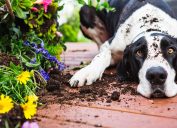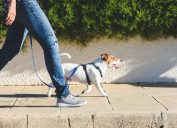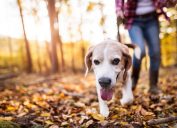10 Household Items You Didn't Know Were Toxic to Dogs, Vets Say
You may not realize these common products can harm your pup.

There is one truth all dog owners can attest to: If it's in your home, your furry friend will find it. Pups have a particular gift when it comes to getting into any and everything, which can leave a mess strewn all throughout your space. While this can be frustrating, most owners' biggest fear is that their pooch will get their paws (and jaws) on the things that they actually aren't allowed to eat, like chocolate. So they work hard to keep certain foods locked far away, out of their dog's reach. But your kitchen isn't the only room where your pet may find something that's bad for them. In fact, veterinarians say there are likely plenty of other things in your space that can also cause them harm. Read on to discover 10 common household items you might not know are toxic to dogs.
RELATED: 11 Surprising Foods That Are Toxic to Dogs, According to Pet Experts.
1
Ibuprofen
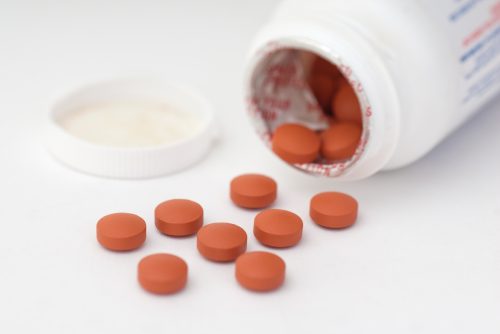
You probably don't think twice before popping an Advil to ease a headache or muscle pain. But if your dog ingests these types of medication, there can be serious consequences.
"Dogs have very narrow therapeutic ranges of medications, meaning that a small amount of pain medication, such as ibuprofen or naproxen, which we think of as harmless and generally very safe for us, can be quite harmful to pets," Caroline Wilde, DVM, staff veterinarian at pet insurance company Trupanion, tells Best Life.
Accidental ingestion can cause gastrointestinal ulcers and kidney damage, so you should contact your vet immediately if your dog swallows any amount. And no, you should never give your dog any dose of pain reliever that's not prescribed by your vet.
2
Rat bait
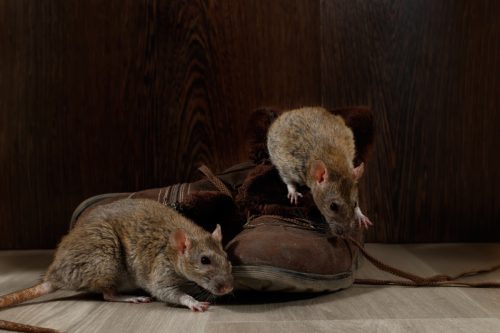
This stuff is bad for rats and dogs alike. Unfortunately, pups get into it way too frequently.
"The most common non-food toxin I see dogs eating would probably be rat bait," Linda Simon, DVM, veterinary surgeon and consultant for FiveBarks, says. "It is used by many people both indoors and outdoors; also, the dog can eat a poisoned mouse, thus ingesting the poison itself."
Rat bait can cause toxicity by impacting the neurological system or by causing internal bleeding, according to Simon.
"Most commonly, the dog's clotting ability is affected and they will bleed internally, which can lead to death," she explains. "This will take a few days to occur, so dogs initially seem fine."
If you suspect your dog may have ingested some rat bait, get to the vet ASAP.
RELATED: The 10 Most High-Maintenance Dog Breeds, New Study Shows.
3
Mothballs
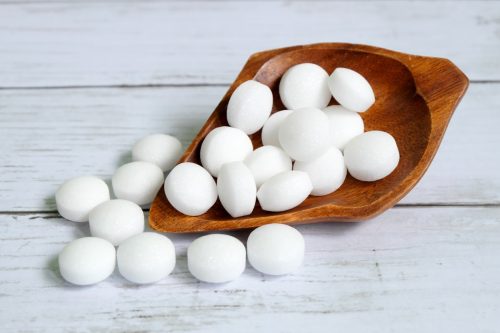
It's important to note that mothballs are a type of pesticide, and pesticides should be kept far away from all pets.
"Mothballs contain naphthalene, which is toxic to dogs and can cause organ damage if ingested," Melissa M. Brock, board-certified veterinarian and writer at Pango Pets, cautions.
Your dog may also display signs of gastrointestinal upset, according to VCA Animal Hospitals (VCAAH).
To use mothballs safely, keep them in a sealed container to reduce the spread of fumes and the possibility that your dog will attempt to play with or eat them.
4
Detergent pods
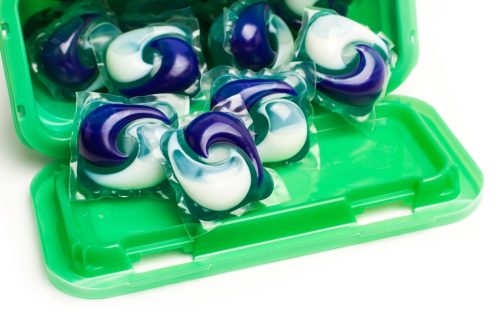
Remember the Tide Pod Challenge? Well, it turns out it's just as dangerous for pups as it is for teens.
"You might think it wouldn't be that harmful as it is soap used to clean things that we use on a daily basis, but they are actually severely toxic to dogs," Alex Crow, DVM, veterinarian working with HappiestDog, says. "They look like a treat when they are in pod form, which is attractive to your dog, so it's important to keep them locked up and out of reach at all times."
Common symptoms of toxicity from these pods include drooling, vigorous head shaking, excessive licking, trouble breathing, vomiting, and an overall sense of distress and discomfort, Crow notes.
5
Fabric softener
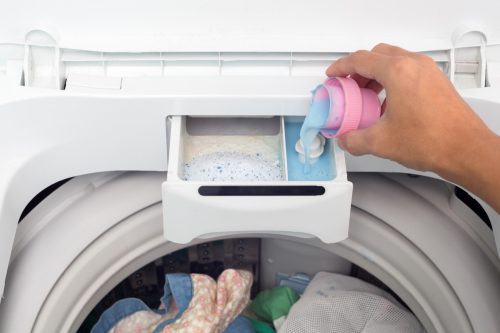
It's not just detergent pods you need to concerned about: Most fabric softeners contain cationic surfactants, which are extremely poisonous for pets.
If your dog were to ingest fabric softener, they could develop "ulcers in the mouth, esophagus, and stomach," Michael Thompson, DVM, experienced veterinarian and founder of Pets Food Safety, warns.
RELATED: Cesar Millan Says You Should Never Walk Behind Your Dog—Here's Why.
6
Batteries
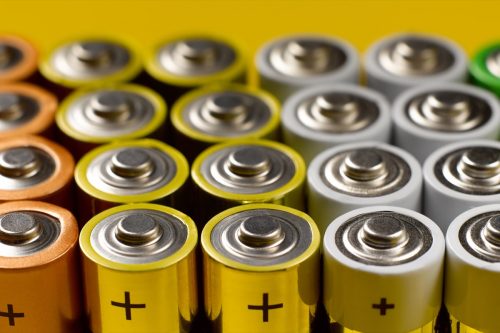
Batteries are likely abundant in your home, but this is also one potential danger that is not always obvious to dog owners, according to Daisy May, MRCVS, veterinary surgeon and pet care writer for All About Parrots.
"If chewed or punctured, batteries can leak alkaline electrolytes, which are poisonous and can cause serious burns in a pet's mouth, esophagus, and stomach," she explains.
May says small batteries that are found in things like watches or calculators are especially risky because of their size.
"I've had to treat dogs who managed to chew open a remote control or chew toy containing these button cell batteries, leading to painful, corrosive injuries," she shares. "Pet owners should keep any items with batteries well out of reach and discard used batteries immediately. It's a risk that's easy to overlook but can have very serious consequences."
7
Tea tee oil
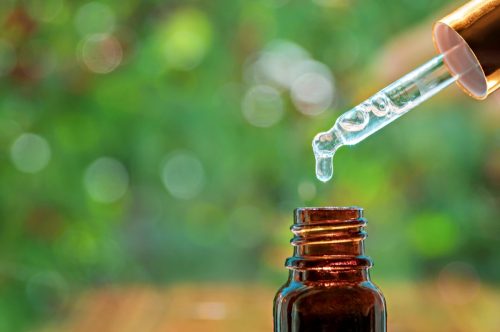
You might have tea tree oil at home, but it's also a common ingredient in many health and wellness products, according to Thompson. Unfortunately, it's also toxic to dogs.
"Tea tree oil can cause vomiting, lethargy, and increased salivation if ingested or applied topically," he says.
8
Xylitol
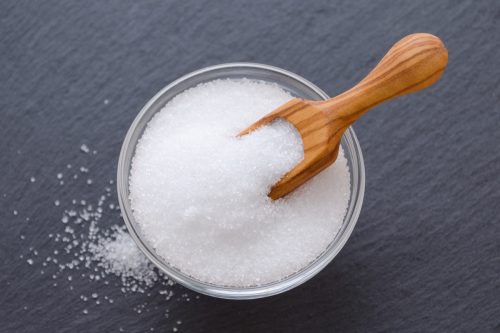
Xylitol is a commonly used sugar substitute that can be "found in everything from gun to peanut butter," Thompson notes. But it's not exactly healthy for your pup.
"In dogs, it can induce insulin release, leading to hypoglycemia and even liver failure," he says.
The U.S. Food and Drug Administration (FDA) has even issued its own warning to dog owners about the dangers of this sugar-free sweetener.
"If you think your dog may have eaten a product containing xylitol, call your vet, emergency clinic, or animal poison control center right away," the agency advises.
RELATED: 5 Things in Your Garden That Are Poisonous to Your Dog.
9
Alcohol
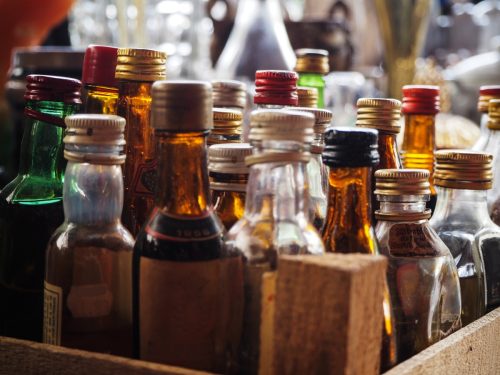
Do you have a liquor cabinet or bar cart in your home? You should be extra cautious about that if you're a dog owner, as alcohol is "extremely toxic when ingested by pets," according to Animal Emergency Care (AEC).
Mary Helen Horn, pet food industry expert and president of the pet nutrition brand Ziwi, confirms this, noting that people may not realize the true severity that alcohol ingestion, skin absorption, or even inhalation could have for dogs.
"Alcohol can cause intoxication, coma, and death in dogs," she warns.
10
Indoor plants
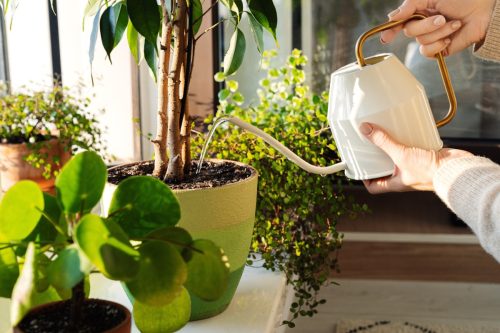
You may know that there are several houseplants that are toxic to dogs, but the veterinarians we talked to thought it was important to stress the issue.
"Not all owners understand how dangerous houseplants are," Wilde says. "Some plants are non-toxic, while others can cause serious adverse effects and even death."
If your dog eats a toxic plant, remove the plant and wash its mouth with water.
"Then bring them to a vet for emergency care, which will likely include vomit induction, intravenous fluids, and other supportive care," Wilde explains.
To prevent issues in the first place, research each plant thoroughly before bringing it into the house. This applies to gifts and floral bouquets, too.
If you believe your dog may have ingested something harmful, contact your veterinarian or the Pet Poison Helpline, a 24/7 animal poison control center, at 1-800-213-6680.
